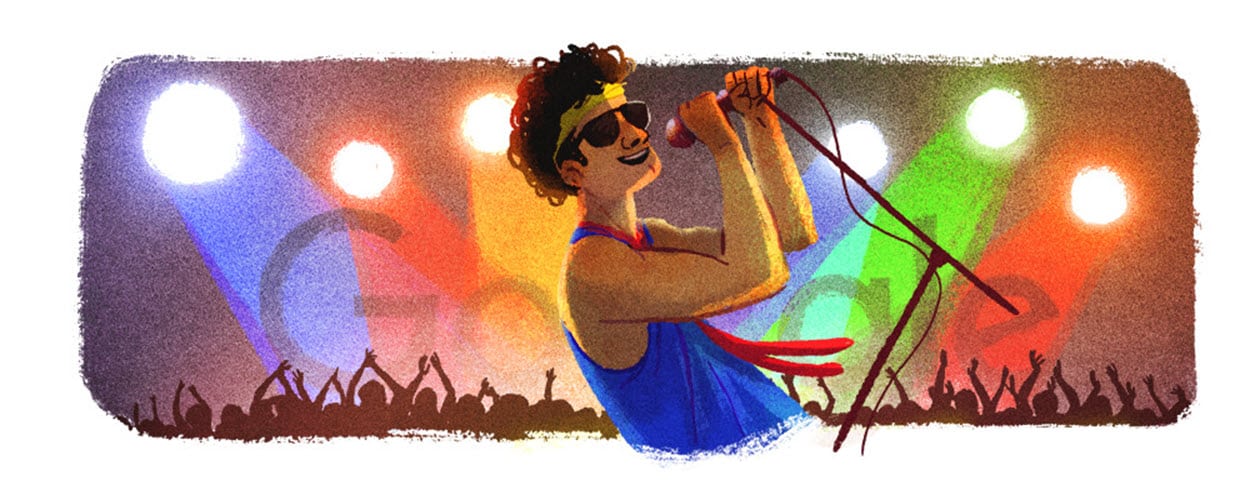Remembering Cazuza: The Voice of Brazilian Rock

Image Courtesy: Google Doodle
Cazuza (4 April 1958 – 7 July 1990), was a Brazilian singer and songwriter.
Early Life And Education
Cazuza, born Agenor de Miranda Araújo Neto on April 4, 1958, in Rio de Janeiro, Brazil, was a prominent Brazilian singer and songwriter. He was the son of João Araújo, a record producer, and Maria Lúcia Araújo, an amateur singer, which gave him early exposure to music. Cazuza enrolled in college in 1978 but left after three weeks to work with his father at Som Livre, a record company. He later moved to San Francisco, where he was influenced by Beat literature. This diverse background helped shape his unique musical style and lyrical depth.
Career And Achievements
Cazuza, born Agenor de Miranda Araújo Neto, was a prominent Brazilian singer and songwriter, known for his significant contributions to Brazilian rock music. He began his career in the early 1980s as the lead vocalist of the band Barão Vermelho. With the band, he achieved great success, particularly with the hit song “Bete Balanço,” which was part of a movie soundtrack. In 1985, Cazuza embarked on a solo career, which allowed him to explore a broader range of musical styles, including blues and Brazilian pop music. His solo work was marked by deeply personal and poetic lyrics, with songs like “Blues da Piedade” and “O Mundo é um Moinho” becoming iconic. Over his nine-year career, Cazuza sold more than 5 million albums and had 11 number-one singles and 18 Top 10 singles in Brazil. Cazuza’s impact on Brazilian music was profound, and he received numerous accolades for his work. He is often regarded as one of the greatest Brazilian poets of his generation, with his music continuing to influence artists long after his untimely death in 1990.
Notable Events And Milestones
Cazuza journey began in the early 1980s as the lead singer of the band Barão Vermelho, where his distinctive voice and provocative lyrics quickly gained him fame. In 1985, he embarked on a solo career, releasing successful albums like “Exagerado” and “Ideologia”. His music often tackled controversial topics such as sexuality, drug use, and political repression, challenging societal norms and values. One of the most significant milestones in Cazuza’s life was his public battle with AIDS. In 1989, he announced that he had contracted HIV, becoming one of the first Brazilian celebrities to do so. His openness about his illness and his advocacy for AIDS awareness and research were groundbreaking at a time when the disease was heavily stigmatized. Cazuza’s bravery in facing his illness and his continued dedication to his music inspired many and brought much-needed attention to the AIDS crisis in Brazil.
Cazuza’s impact on history extends beyond his music. He is remembered as a pioneering artist who used his platform to advocate for social change. His fearless approach to songwriting and his willingness to address taboo subjects helped to shift cultural conversations in Brazil. Even after his death in 1990, his legacy continues to inspire new generations of musicians and activists. His life and career were celebrated in the biographical film “Cazuza: O Tempo Não Pára,” released in 2019. Cazuza’s contributions to society, culture, and the world at large remain significant, as he is remembered not only for his musical talent but also for his courage and advocacy. He passed away on 7 July 1990, at the age of 32, leaving behind a legacy as one of Brazil’s most iconic and influential artists.
Awards And Honors
Cazuza, a prominent Brazilian singer and songwriter, received several notable awards and honors throughout his career. Here are some of the key recognitions:
- **Sharp Music Awards**: Cazuza won multiple Sharp Music Awards (now known as the Brazilian Music Awards) for his contributions to Brazilian music.
- **Golden Globe Award**: He received a Golden Globe Award for Best Brazilian Singer.
- **Troféu Imprensa**: Cazuza was honored with the Troféu Imprensa, a prestigious Brazilian award given by the press.
- **Posthumous Recognition**: After his death, Cazuza was posthumously awarded the Ordem do Mérito Cultural, one of Brazil’s highest cultural honors, for his significant impact on Brazilian culture and music.
- On 4 April 2016, Google celebrated Cazuza’s 58th birthday with a doodle.
Cazuza’s legacy continues to be celebrated for his influential music and his courageous public battle with AIDS, which helped raise awareness and reduce stigma around the disease in Brazil.
Additional Resources
To learn more about Cazuza, the iconic Brazilian singer and songwriter, here are some valuable resources:
Books
- **”Cazuza: Só as Mães São Felizes”** by Lucinha Araújo – This biography, written by Cazuza’s mother, provides an intimate look at his life and career.
- **”Cazuza: Preciso Dizer que Te Amo”** by Regina Echeverria – Another insightful biography that delves into Cazuza’s personal and professional journey.
Documentaries
- **”Cazuza: Time Doesn’t Stop” (2004)** – This film chronicles Cazuza’s life, from his rise to fame with the band Barão Vermelho to his solo career and battle with AIDS.
- **”Cazuza” (1989)** – Available on the Internet Archive, this documentary offers a glimpse into Cazuza’s life and music.
Museums and Exhibits
- **Museum of Image and Sound (MIS) in São Paulo** – This museum often features exhibits on Brazilian music icons, including Cazuza.
- **Cazuza’s House in Rio de Janeiro** – Although not a formal museum, visiting the neighborhood of Ipanema where Cazuza grew up can provide a sense of his early life and inspirations.
These resources should provide a comprehensive understanding of Cazuza’s impact on Brazilian music and culture.
Observer Voice is the one stop site for National, International news, Sports, Editor’s Choice, Art/culture contents, Quotes and much more. We also cover historical contents. Historical contents includes World History, Indian History, and what happened today. The website also covers Entertainment across the India and World.

